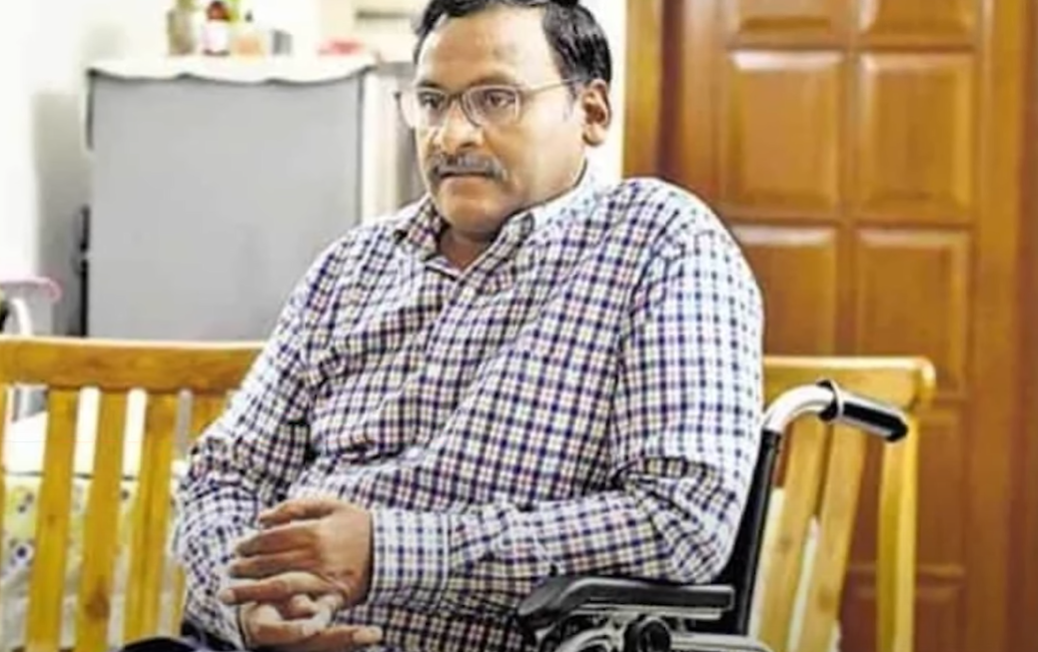Wheelchair-bound Indian former professor freed after being sentenced under anti-terror law in 2017
GN Saibaba was arrested under contentious anti-terror law

Your support helps us to tell the story
From reproductive rights to climate change to Big Tech, The Independent is on the ground when the story is developing. Whether it's investigating the financials of Elon Musk's pro-Trump PAC or producing our latest documentary, 'The A Word', which shines a light on the American women fighting for reproductive rights, we know how important it is to parse out the facts from the messaging.
At such a critical moment in US history, we need reporters on the ground. Your donation allows us to keep sending journalists to speak to both sides of the story.
The Independent is trusted by Americans across the entire political spectrum. And unlike many other quality news outlets, we choose not to lock Americans out of our reporting and analysis with paywalls. We believe quality journalism should be available to everyone, paid for by those who can afford it.
Your support makes all the difference.An Indian court has acquitted a former Delhi University professor who was arrested over alleged links to left-wing extremists under a contentious anti-terror law.
GN Saibaba, who was arrested in February 2014, is an academician and activist who taught English at the prominent university and suffers 90 per cent physical disability from a post-polio paralytic condition.
He was sentenced to life imprisonment in 2017, three years after his arrest in February 2014, for alleged links to the banned rebel outfit Communist Party of India (Maoist) under the Unlawful Activities (Prevention) Act (UAPA) and recruiting others to join the unit.
On Friday, a court ordered for his immediate release from jail.
The Bombay High Court’s Nagpur division bench order, seeking Mr Saibaba’s release, came after an appeal filed by him in 2017, challenging a trial court’s order of conviction and sentencing him to life imprisonment.
Paralysed from waist down, Mr Saibaba has remained lodged at the Nagpur central prison.
The state court’s smaller bench also acquitted five other convicts – one of whom died pending the hearing of the case by the court – in the case.
The convicts have been ordered to be released forthwith from jail unless they are accused in any other case.
According to the judges, the proceedings before the sessions court are “null and void” in absence of a valid sanction under the UAPA act – which has been widely criticised as a tool being used to take arbitrary action against government critics, including lawyers, student activists, journalists, poets, academics and civilians from the contested region of Kashmir.
Several appeals were made by Mr Saibaba’s family members, stating that his health has deteriorated inside prison in the absence of medical care, sparking fears of his death in jail.
Celebrating Mr Saibaba’s release from the prison, his wife Vasanta Kumari said the Indian academician was framed in the case. Mr Saibaba had denied any involvement in the case.
“He is an intellectual and a teacher. He was framed in the case. His health has deteriorated and his limbs are not working properly because of spending seven years in jail. At present, my brother-in-law is in Nagpur to complete the formalities,” she told Indian daily The Indian Express.
“We had faith he would be acquitted. We are thankful to the judiciary and to those who supported us,” Ms Kumari said.
Join our commenting forum
Join thought-provoking conversations, follow other Independent readers and see their replies
Comments